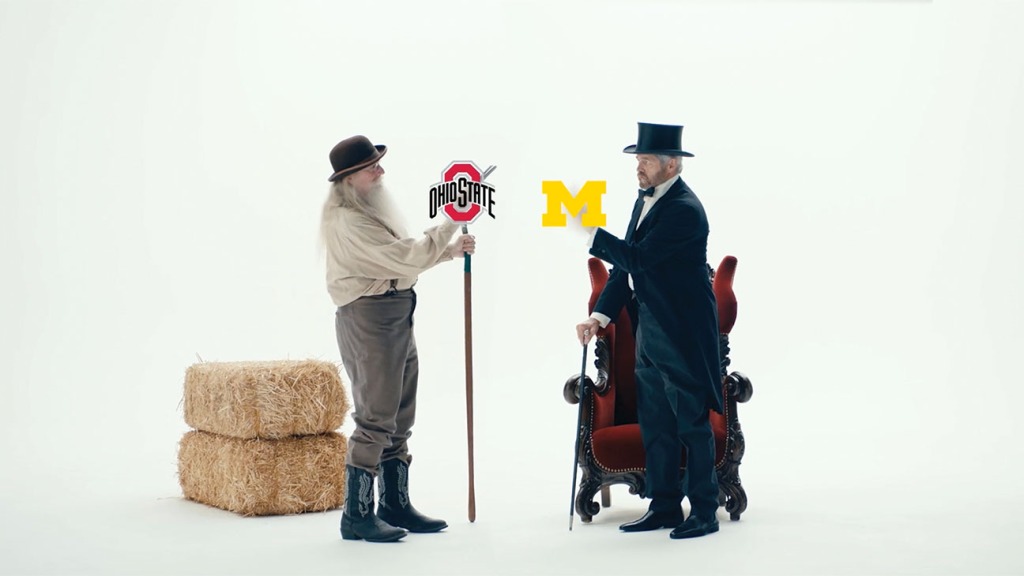
For Oscar-winning actor J.K. Simmons, the rivalry between Ohio State and University of Michigan football fans is an intense part of his life. A self-professed die-hard Buckeye who grew up in the Columbus suburbs and briefly attended Ohio State before transferring to the University of Montana, Simmons is ride-or-die when it comes to Ohio State football.
That might make him an unreliable narrator for a doc about the culture of the Ohio-Michigan rivalry, but that’s what the creative team behind Rivals: Ohio State vs. Michigan was hoping for. The TC Studios documentary is an irreverent look at the history between the Buckeyes and Wolverines, delving into the psychology of such intense feuds and their effect on mass culture. Simmons spoke with THR about providing narration for the film and the intensity of his fellow college football fans.
Did you feel biased when you took this job?
Oh, a hundred percent. I had to get clearance from some of my old pals from junior high and high school to even be able to say the name of the other team in the rivalry. People in Columbus don’t speak that word. [Legendary Ohio State head coach] Woody Hayes called them “that team up north” — ever since then, that’s been how most Buckeye fans refer to them. On the Ohio State campus, they cross out every “M” on every sign on campus the week before the game. And if you are going to say the name of that team, [don’t say Wolverines,] just say “Michigan.”
I mean this in the kindest way possible, but there’s an absurdism to this rivalry, no?
At least from my perspective and most real, hard-core fans I know, there is this actual, intense feeling, this fairly strong dislike, for that other team. They did such a great job in this documentary; they have [NFL Network host] Rich Eisen [who went to Michigan] and me as two fairly rational, reasonably mature human beings able to actually have a dialogue — even though we do have this sort of Hatfields and McCoys vibe for each other’s schools.
J.K. Simmons
Courtesy of TC Studios
It’s rare for a documentary narrator to be seen on camera. In Rivals, you break the fourth wall in a way that’s almost poking the audience.
They’d asked me to do [the narration, which is] one of the fun things that I enjoy from time to time, whether it’s a nature documentary or a book on tape. I was already on board to do it. A few weeks later, they approached my agent and said, “Would you mind if we kind of break the fourth wall and put him on camera a little bit?” And I said, “Well, as long as I can be wearing a Buckeyes cap.”
The tone is very witty and irreverent and throws a lot of psychology and social science in there, too, in a way that’s still digestible. How serious did you feel like you had to be, or did you get to play with the tone of your narration?
It was not dissimilar to most films or television projects. If it’s clearly well-written, it’s often pretty straightforward for people to get on the same page. We just had a couple of very brief conversations about the tone, but I think it was so well laid out on the page that we pretty quickly flipped into something that the guys were on board with, and we just took off running.
Once you win a bunch of acting trophies, everybody feels like they have to approach you a little differently. And the good news is that I find myself in a position where [directors are] more open to collaborating. It happened, maybe twice — mild-level paraphrasing — that I asked them if I could do something, and they were open to it. Sometimes that works and ends up in the final cut. And sometimes it’s like, “You know what, it’s kind of better the way we wrote it.” It did feel very much like, forgive the pun, a team sport both before and during the recording.

Michigan Stadium (“The Big House”) on the Ann Arbor campus.
Courtesy of TC Studios
Have you ever had a rival — even someone who raised the bar for you because you were in silent competition?
Often, those silent competitions are very one-sided. When I first moved to New York and was still barely daring to even dream about being on Broadway, when I could actually scrape together the money to see a show, I would see a 29-year-old boy who’s losing his hair up there [onstage] and think, “Man, I wouldn’t mind having that guy’s career.” He didn’t even know there was a rivalry going on, but from my perspective there was.
As the labor movement builds steam in Hollywood, a lot of people are concerned about the role of AI — I’ve heard fears that studios might use it for voiceover and narration. Does that make you nervous?
I’m basically a Neanderthal. I am, overall, technophobic. I begrudgingly acknowledge that technology is a useful tool. And look, I’m in a position where if there’s a job that I don’t get, I’m still paying the mortgage. But for the everyday, working class actor who’s out there trying to get enough weeks to make their insurance coverage so their kids will be healthy … the idea of a computer taking away voice work is appalling just from a union worker level. Equally important to me: No matter how creative or genius your programming is, that’s a machine. Ones and zeros don’t have feelings.
Interview edited for length and clarity.
This story first appeared in a June stand-alone issue of The Hollywood Reporter magazine. To receive the magazine, click here to subscribe.














